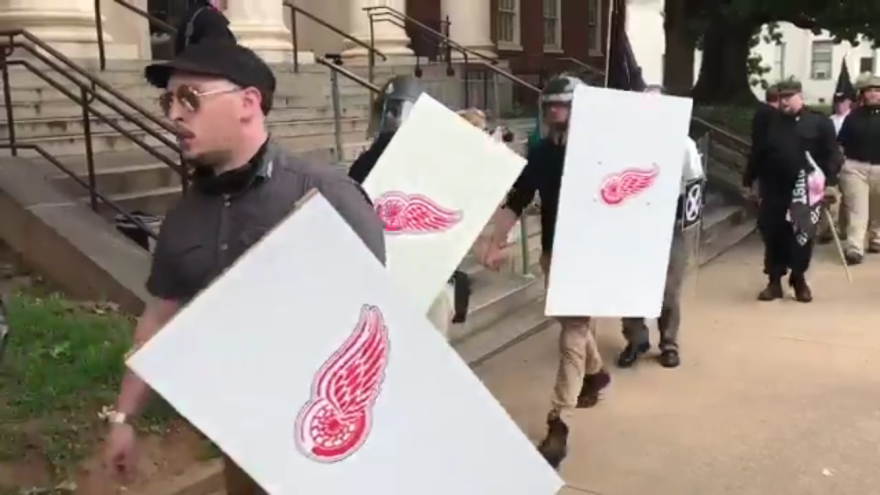White supremacist groups gathered in Charlottesville over the weekend, sparking violence and national outrage. Participants carried torches, guns, and Confederate and Nazi symbols, as white supremacists are wont to do, but some were also seen carrying shields adorned with… the Detroit Red Wings logo.
Ahead of the rally, another group has joined - chanting "blood and soil" as they approach #EmancipationPark. #Charlottesville pic.twitter.com/BcibSDB3MZ
— Craig Stanley (@_CraigStanley) August 12, 2017
The hockey fansite Russian Machine Never Breaks first reported the use of the logo Saturday morning, and it immediately had people wondering why these white supremacists had appropriated the team’s famous winged wheel.
The logo, which had been adjusted to incorporate Nazi symbols, was traced to a Twitter account called the “Detroit Right Wings.” The description said the group’s focus is “direct activism.” The account was deleted Saturday.
For those wondering: pic.twitter.com/YaMsVqRuk8
— realbighappy (@realbighappy) August 12, 2017
A YouTube page under the same name had posted a video in an attempt to raise money to travel to the Charlottesville rally. (Their GoFundMe page raised $328 with a total of four donations. Their goal was $2,500.)
The YouTube account has also been deleted, but CNN reports that the video included footage of a confederate war statue being taken down as the narrator says, "our histories erased." CNN noted that Michigan was a part of the Union during the Civil War.
The description also explained that the Detroit Right Wings participate in “regular activism related the [sic] the cause of preserving our people.”
The Detroit Red Wings quickly issued a statement Saturday, condemning the rally in Charlottesville and claiming that legal action is being pursued.
— Detroit Red Wings (@DetroitRedWings) August 12, 2017
But despite the now-removed social media accounts, who the Detroit Right Wings are remains unclear.
A European movement reinterpreted in the U.S.
The Detroit Right Wings claim to be a part of the larger anti-immigrant, white nationalist Identitarian movement, which began in Europe and has recently gained traction in the United States.
Cas Mudde is an associate professor specializing in the study of far-right extremist groups at the School of Public and International Affairs at the University of Georgia, and he spoke with Stateside’s Cynthia Canty to explain this ideology.
He says the Identitarian movement started in Europe as an ethnocentric white nationalist movement.
“It comes out of a movement called the New Right in France, the Nouvelle Droite, which kind of modernized radical right thought, and to a certain extent modernized racism. And they did this through a certain ideology they called ‘ethnopluralism.’”
Ethnopluralism, Mudde explains, emphasizes ethnicity over race, and is based on the belief that ethnic groups are inherently different and therefore should all live separately. Identitarianism does not advocate for racial supremacy or the destruction of “lesser,” non-white populations.
"They are looking for provocations that will attract media attention." - Cas Mudde
But Mudde says that in the U.S., the Identitarianism label has largely been adopted, and misinterpreted, by white supremacists.
“It has been mostly used by people who are called the alt-right, and who are actually mostly white supremacists. Which is kind of weird, because European Identitarians would normally not speak in racial categories and they would also not be supremacists.”
Mudde says that despite some differences in ideology, European and American Identitarians share a similar demographic: young, higher-educated white men.
“And they are shocking,” he adds. “They are looking for provocations that will attract media attention.”
And what better way to attract attention than to misappropriate a nationally known and beloved Michigan symbol.






